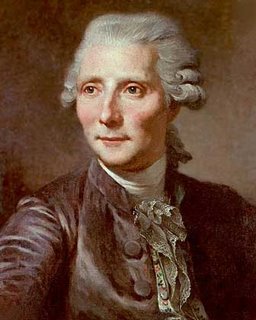
“Pierre Augustin Caron, better known as Beaumarchais, is famous as the creator of the plays The Barber of Seville and The Marriage of Figaro. He managed to send enough arms, ammunition, and equipment to keep 25,000 men in the field – material one biographer credits with being decisive in carrying out the campaign that resulted in the world-changing victory at Saratoga. The cost of the shipments has been estimated as five million livres (or about a million dollars), much of the money coming out of Beaumarchais’ pocket…” Allen Barra, American Heritage Magazine May/June 2000.
Today we began our study of The Marriage of Figaro and I found this information to be amazing. We also had a long lecture on the history of Freemasons, and Masonic philosophy, practices, symbolism, and so on which was very interesting even though I had to tell him who Fu was.
According to this guy, all the founding fathers were Masons except for one. Does anyone know if that’s true, and if so which one was not a Mason? Was it Jefferson? You’d think he’d be a Mason since he was such a big deist and also an architect. Freemasonry kind of disgusts me because it has been so exclusive of women, and seems like a bunch of guys dressing up in aprons doing stupid rites. But hey, many might say the same about the Catholic Church, right?
I bought a ticket for Meistersinger next Tuesday because I didn’t feel like standing up for five hours. Meanwhile, I am on my way to Venice, reading a strange historical novel about Lorenzo da Ponte, Mozart’s Librettist. I hope to learn more about him over the next week as we dive into Figaro. He did an amazing job cutting down Beaumarchais’ lines while preserving the essence.
I have put a link to the pensione I'll be at in Venice so you can imagine yourself there with me.


1 Comments:
At 10:31 PM, Mahlon Meyer said…
Mahlon Meyer said…
All this is pretty interesting. So Mozart on one hand craved the approval or rather the rapprochement with his father but on the other hand was destroyed by his fears, his pusillanimity, his (his father's) unwillingness or inability to give the kind of encouragement and life that Mozart wanted and needed. What a sensitive plant that artist is and how easily the winds of discontent from authority can ruffle the leaves, dry up the bark and uproot new blossoms (never another violin concerto written again).
You're certainly being exposed to all sorts of influences. I saw the homage being paid to Wagner. I don't know about Wagner, even though you are now an expert on the Ring. Isn't his music sort of anti-this-world. It seems to me, the little I know of Wagner's music, is that even his most uplifting, heroic songs are so surreal (not in a disjointed sense but inmbued so deeply with mythological motifs) that they are anti-life. Of course, if you listen to his more somber pieces, I think specifically of das liebestod or however you spell it, it is almost anti everything that we consider bright, uplifting, natural. That's what it is. Wagner seems to have taken the offering that Goethe laid out, alchemic almost, to choose devil-worship over nature-worship. It seems to the layman, to the neophyte, to the fool, such as Hans Castorp, who nevertheless was aware of much more in German music than this writer, that Wagner is all anti-nature, anti-natural, whereas someone like Beethoven or perhaps Mozart affirm the natural world. You can connect their music with the world of growing things around you. Mahler even is more connected with the natural world. Wagner is not, I think. My comment.
Post a Comment
<< Home